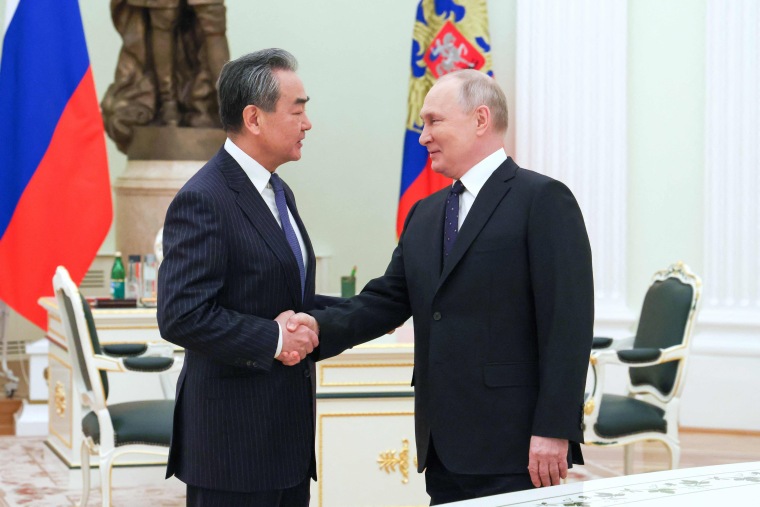Why China’s Ukraine balancing act might be tilting in Putin’s favor
Putin #Putin

HONG KONG — A flurry of European diplomatic activity over Russia’s war in Ukraine has offered a stark contrast this week: While President Joe Biden made a surprise visit to Kyiv, one of China’s most senior diplomats was heading to Moscow.
Wang Yi, Chinese President Xi Jinping’s senior foreign policy adviser, gave one of the strongest indications yet of Russia and China’s strengthening ties on Wednesday.
“We are ready to deepen our strategic partnership,” he said according to Reuters. “Other countries cannot put pressure on our relations,” Wang added as he met with President Vladimir Putin, who said he was looking forward to a visit by Xi Jinping.
The comments will feed fears that Western backing for Ukraine will be matched by China doubling down on its bet on the Kremlin. Beijing has been engaged in a delicate balancing act, experts told NBC News, but may find that increasingly strained as the conflict moves into its second year.
Washington has accused Beijing of providing Russia nonlethal military assistance against Ukraine, and even considering providing lethal aid. China denies the allegations, saying the U.S. has escalated the situation by sending weapons to Kyiv.
 President Vladimir Putin welcomed Wang Yi warmly on Wednesday.Anton Novoderezhkin / AFP – Getty Images
President Vladimir Putin welcomed Wang Yi warmly on Wednesday.Anton Novoderezhkin / AFP – Getty Images
Beijing insists it is committed to promoting peace talks to end the war in Ukraine, and will release a policy paper in the coming days explaining its views on a potential diplomatic settlement.
China is “deeply worried” the Ukraine conflict could spiral out of control, Foreign Minister Qin Gang said on Tuesday. “We urge certain countries to immediately stop fueling the fire,” he said at a security conference in Beijing, in an apparent reference to the United States.
China and Russia, both major powers that share a 2,500-mile border, view themselves as counterweights to American global dominance. Their relationship has been under greater scrutiny since last February, when Xi and Putin released a lengthy joint statement declaring a “no limits” partnership just weeks before Moscow invaded Ukraine.
The two leaders, who have met more than three dozen times in the past decade, have “a very good personal relationship [and] call each other old friends,” said Zheng Wang, director of the Center for Peace and Conflict Studies at Seton Hall University in New Jersey.
Since the war began a year ago, China has refrained from condemning Russia’s aggression while urging peace talks, expressing concern about the humanitarian situation and being careful to avoid violating international sanctions.
China has been “trying to achieve two things at once,” said Joseph Torigian, an expert on China and Russia at American University in Washington.
“On the one hand, it wants to be supportive of Russia because, over the long term, they see Russia as a key partner in an increasingly competitive relationship with especially the United States,” he said. “But, at the same time, they’re concerned about economic and reputational cost, especially in the European Union.”
While trade with Beijing may help the Kremlin’s war machine, there has so far been little evidence of China “breaking sanctions and providing lethal material or weapons to Russia,” Torigian said. But as Russia struggles on the battlefield, he added, China “may come under increasing pressure from the Russian Federation for assistance that might put them in an increasingly difficult spot.”